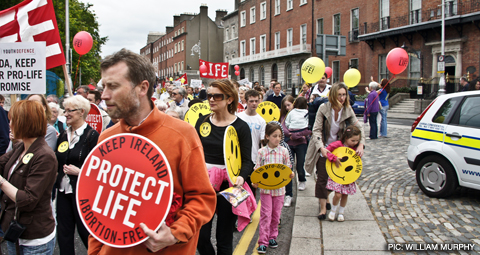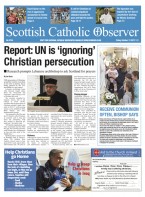October 13 | ![]() 0 COMMENTS
0 COMMENTS ![]() print
print

Aggressive secularism is on the rise in Ireland
DAVID QUINN takes stock as upcoming referendum on abortion looms
Ireland is to have another abortion referendum next year, probably in May or June. There was a very big pro-abortion march in Dublin in early October, the biggest for some time, as pro-abortion groups ramp up the energy levels ahead of the referendum. A bigger pro-life march took place in Dublin some months before.
We haven’t seen the wording of the referendum yet. The wrong wording will open the door to abortion on demand in Ireland.
The fact that Ireland is to have another abortion referendum is a further indication of how secular Ireland is becoming. In a sense, abortion is the last big referendum issue for social liberals and those who devoutly wish for an Ireland in which laws and public policy have been wiped clean of a Catholic or Christian influence.
A few years ago, the Iona Institute (which I head) had Scottish academic Tom Gallagher over to give a talk on aggressive secularism in Scotland. Tom and I compared notes, so to speak, on secularism in our two countries and wondered which was worse. I think we concluded that Scotland still had its nose in front, but not by much. At that point, Scotland had already liberalised its abortion law and introduced same-sex marriage.
Ireland and Scotland are two Celtic countries in which religion was once very strong and dominant. We now seem to be doing our best to shake off our pasts by going as far as we can in a different direction.
It’s interesting to observe that the countries which have most eagerly embraced same-sex marriage and other LGBT rights are those with something of a chip on their shoulder about their pasts. Recently, the Maltese parliament legislated in favour of same-sex marriage by an overwhelming margin. Only one solitary MP voted against it
Spain rushed to embrace same-sex marriage some years ago, as did Argentina. Ireland did so in 2015 when it was approved by a margin of 62-38 per cent in a referendum. On that occasion every single political party was in favour. Only about half a dozen TDs and senators were publicly opposed.
Big business lined up in favour. American money poured in to gay rights groups in the run-up to the referendum. Police officers in full uniform turned up at Yes campaign events. Former Irish President Mary McAleese came out in favour, breaking with past practice of former presidents keeping their counsel on such occasions.
The Catholic Church said and did very little, partly because it has been so badly weakened by the scandals.
Many western countries have by now legalised same-sex marriage, but in the teeth of more opposition than in the likes of Ireland. In France, parliament was split almost 50/50. In Britain, half of Conservative Party MPs voted against. In the German parliament recently, the split was 60/40 in favour with Angela Merkel herself voting against. In Austria it was defeated on a free vote a few years ago and it is barely even on the agenda in the Italian parliament.
It is interesting, then, that countries that feel most guilty about a socially conservative past are most eager to embrace gay marriage as a way of signalling to the world how much they have changed.
It so happens that Ireland, Argentina and Spain also have three of the most radical transgender laws in the world. In Ireland, your physical body is now considered totally irrelevant to the sex—gender—you claim to be. In other words, you can be anatomically a man in every way and call yourself a woman and the state will change all of your official documentation to reflect your self-image.
In Scotland, as in Ireland, conscience rights receive weak protection. We have all read about the Scottish midwives who were told they must assist patients before and after they have an abortion.
In Ireland, although abortion is only available in very limited circumstances, hospitals must be willing to perform abortion under those circumstances, even when they are Catholic hospitals.
Pharmacies must sell the morning-after pill, like it or not. Under laws requiring the reporting of child sex abuse allegations, the seal of Confession will not be respected.
In a way, the secularising influence on Irish society has to be read in two ways. First, how secular has our political and public culture become? The answer is ‘very much so,’ as we have seen.
But the second way to read it is how secular ordinary Irish people have become. In this regard we are still a lot less secular than Scotland. For example, about a third of Irish people still go to Mass each week and the census conducted last year showed that 76 per cent of Irish people are still willing to identify as Catholic.
In addition, hundreds of thousands of people still visit the Marian shrine of Knock in Co Mayo each year, and in general traditional devotions remain quite strong in Ireland.
It wouldn’t do to exaggerate though. Younger people are very secular in the sense that they almost never attend church and many are ferociously anti-Catholic.
Worryingly, even Mass-goers have learnt to ‘privatise’ their Faith. That is, they almost never talk about their Faith in public and when it comes to matters of public policy many separate their politics from their religious beliefs, a very strange thing to do because it is effectively a declaration that Christianity has nothing to say about the just ordering of society, and that this is a matter best left to others.
A former Government minister once said that he leaves his beliefs at the office door when legislating. That raises the question, what beliefs did he bring to bear when legislating and why? And why leave his religious beliefs, but not others, at the office door?
Sad as it is to say it, many Irish Catholics have adopted a sort of ‘Indian reservation’ version of Catholicism.
By this I mean that they have acquired a mentality that says their religious beliefs belong only in ‘religious reservations,’ like Native Americans who were taught to live only on the reservations set aside for them and not on the wide-open plains where their ancestors once roamed.
Many of our bishops, too, have learned to keep quiet and restrict themselves to talking about spiritual matters rather than challenge an often aggressively secular state and establishment.
In this kind of highly pressurised and often intolerant environment, Scottish and Irish Christians have to learn how to ‘step off’ the reservation once more and claim their rightful place in the public arena.
They have to assert that they have as much right as anyone else to be there, influencing society and public policy with their own Christian image of what justice is.
In Ireland next year, our task will be to ensure that Ireland’s vision of justice continues to embrace the right-to-life of the unborn and does not take this right away in the name of another, far more inadequate vision of ‘justice.’
If we fail it will be a strong indication of which how secular Ireland has become. Fortunately, we have more than a fighting chance of winning this one.
– David Quinn is a former editor of The Irish Catholic and a columnist for the Irish Independent.











